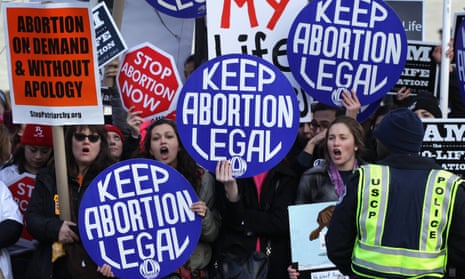The anti-abortion movement has one resounding goal: overturn Roe v Wade, the landmark 1973 US supreme court case that solidified abortion as a constitutional right. And while this goal is often shrouded in faux concern for the safety of pregnant people or the sanctity of life, dismantling the right to bodily autonomy for more than half the population has always been their holy grail.
With the election of Donald Trump and the appointment of two conservative supreme court justices, Neil Gorsuch and Brett Kavanaugh, the need to hide this goal from a public that overwhelming supports Roe v Wade has vanished. Recently, 39 Republican senators signed an amicus brief calling for the supreme court to reconsider and overturn Roe. It was the anti-abortion movement going all in – seizing a moment they’ve been working towards since 1973.
This attack on Roe is blatant; it is horrifying for anyone who values human rights; it is worthy of our attention, our outrage and our action. The names of those 39 Republican senators remind us that what so-called pro-life politicians really want is to control the lives of pregnant people by supporting government-mandated forced birth. But just as noteworthy is the senators who did not lend their names to the brief.
The telling absence of Susan Collins (Maine), Dan Sullivan (Alaska), Martha McSally (Arizona), Shelley Moore Capito (West Virginia), Cory Gardner (Colorado), Mitch McConnell (Kentucky), Lindsey Graham (South Carolina), and David Perdue (Georgia) – all up for re-election in 2020 – is a reminder that the public is not on board with the anti-abortion movement’s ultimate goal. And vulnerable lawmakers know it.
Those who signed the brief wrote, “Forty-six years after Roe was decided, it remains a radically unsettled precedent: Two of the seven justices who originally joined the majority subsequently repudiated it in whole or in part, and virtually every abortion decision since has been closely divided.”
But the public is not divided on abortion. In 2019, public support for abortion rights is the highest it has been in 20 years of polling, according to the Pew Research Center. A reported 61% of Americans believe abortion should be legal in all or most cases, and only 12% of the public want to see abortion made illegal. A third of Republicans support abortion rights, according to a 2017 Pew Research poll, and in states where lawmakers have attempted to ban abortion entirely, most voters do not support it. Only 31% of voters in Alabama approved of the latest law that would ban abortion in all cases, making zero exceptions for rape, incest, or the pregnant person’s life.
The Republican senators up for re-election – members of a political party that has long pontificated about the morality of abortion while silently paying for their wives’ and mistresses’ abortions – know public opinion is not on their side. Currently, Senator Collins is fighting for her seat after she voted to confirm Kavanaugh – who, despite his claims that he views Roe as judicial precedent, is a clear threat to the continued constitutional right to abortion. A reported 50% of Maine voters disapprove of her job performance, per the Hill, and in an October 2019 poll Collins trailed her Democratic opponent by four points.
Collins, along with McConnell and Graham, will be fighting for her job in 2020. And after watching the former Kentucky governor Matt Bevin – an unapologetic anti-abortion advocate who championed laws that left Kentucky with only one abortion clinic – lose his seat to a Democrat by more than 5,000 votes in a district Trump won handily in 2016, the consequences of siding against public consensus on abortion are all the more clear.
In 2016, 54% of voters said abortion was “very important” to their vote. Since voters’ enthusiasm for participating in the political process is the highest it has been in more than 20 years, those who ignore the public’s wishes are likely to be held accountable. Even calling now-Kentucky Governor Andy Besmear “Abortion Andy” for his refusal to defend Kentucky’s anti-abortion laws couldn’t save Bevin’s job.
Attacks on abortion rights aren’t just in direct contradiction of the fundamental ideals that have shaped American freedom and democracy, they are wildly unpopular and politically hazardous. So while those who feel a modicum of job security continue to frame abortion as a divisive political issue, those fearful for their future employment status know better. They know we’re watching.
Danielle Campoamor is a reproductive justice and abortion rights advocate and freelance writer published in the New York Times, the Washington Post, the Daily Beast, CNN, NBC, Newsweek and others
